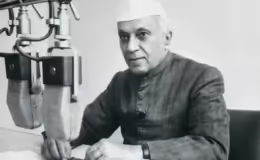Diplomacy – the Narendra Modi approach
- By : Anirban Ganguly
- Category : Articles
The Prime Minister of India ought to be able to travel with ease in the South Asian region without hindrance, encumbrance or hesitation. Prime Minister Modi’s visit to Kabul and his sudden stopover in Lahore is symbolic of the fact that in her quest to evolve into a responsible and capable power India not only retains the capacity to be firm when required but also seeks to further the track of “samvad” in a quest for stability and a resolute response to the rising tides of terrorism and challenges of instability in the region.
Such is the level of confidence that India needs to have, such is the ease with which she needs to approach and outreach with others in the region. In fact, if a hitherto moribund SAARC, needs to be given a cohesive shape, an effort which Prime Minister Modi had begun in right earnest a year and a half back, if the entire region stretching from Kabul to Dhaka and from Maldives to Colombo needs to be woven into a dynamic region of shared prosperity and stability then this is the ease which needs to move and dynamise that vision. Civilisationally this entire region has been the sphere of India’s most dynamic exchanges on the material and cultural level. It is this region that was once the carrefour of the world controlling trade, regulating movements and celebrating varied ideas and innovations and advances. That today it has turned into one of the most challenging terrains is no reason why India should abdicate, as it had done in the past one decade, its freedom of movement and of outreach.
India’s movements and outreach cannot remain hostage or dependent or dictated to by forces of instability that operate within the region and others – extraneous to the area – who wish to regulate her quest for a strategic depth. By literally clearing the path from Kabul to Dhaka in the last one and half years Prime Minister Modi has demonstrated a grit and tenacity that has been rarely seen in the past in the Indian foreign policy establishment. Some have termed his policy and approach to Pakistan as a “flip-flop” one while others have argued and perhaps more perceptively that he has and is continually exploring all options and dimensions when it comes to engaging with Pakistan.
In this exploring and working out of various options, one thing has however has very starkly emerged and it is that retaliation or response can go along with engagement and outreach. In a sense, there is literally an option for all sections. In a growing tendency on the world scene – especially after Mr Modi has taken over – to de-hyphenate engagement with India with her relations with Pakistan and with India increasingly playing a crucial role in decisions that are important for the globe as a whole, it is important that India secures her immediate region and inaugurates an era where ease of movement and of engagement becomes the order of the day.
Some have observed how Mr Modi would face opposition from home especially from the RSS which, they argue, have always opposed any engagement with Pakistan. Such a reductionist understanding is of course clichéd and is only perpetrated by those who run shop by creating Armageddon scenarios. They did this when Modi came to power and they continue to do it at regular intervals – it is only in an imaginary atmosphere of conflict or impending deluge that they seem to remain well exercised and oiled.
In an interaction earlier this year the RSS joint general secretary Dattatreya Hosabale had made an interesting point when asked pointedly about Pakistan. Hosabale had noted, to the surprise and consternation of many of the end-of-the-world predictors, that India was part of SAARC and had a familial cultural relation and resemblance with her neighbouring countries and that people living in the region “are part of the same family”. Relations thus can deteriorate at times as they do between brothers, Hosabale observed, but there had to be continuous efforts on how “we can improve relations with those who are historically and geographically attached to us.” Hosabale’s statement stumped the majority of those gathered there, especially those who were looking for the horned monster that they thought the RSS would let out of the bottle to torment the Narendra Modi dispensation.
Narendra Modi’s Lahore stopover was an assertion of that familial cultural and civilisational resemblance and recognition of the historical and geographical attachment between people and countries of the region. Recognising such an underlying reality and demonstrating it with confidence requires certain strength of conviction and of purpose. A pusillanimous approach can hardly conceive or execute such a movement – the Congress party only knows that too well. Interestingly, Mr Modi’s Lahore visit comes soon after a near defunct Congress leader had asked the Pakistanis to remove Mr Modi if they expected dialogue with India to resume!
From Moscow to Kabul via Lahore, the last two and a half days have in fact demonstrated action in all five dimensions of India’s foreign policy – ‘Samman’ — dignity and honour; ‘Samvad’ — greater engagement and dialogue; ‘Samriddhi’ — shared prosperity; ‘Suraksha’ — regional and global security; and ‘Sanskriti evam Sabhyata’ — cultural and civilisational linkages.
It was indeed an interesting trip – where one saw Russians professing to the Indian Prime Minister that they aspired to build a Hindu temple in Russia and chanted Vedic hymns before him, where one witnessed how India lent active support to the right forces in Kabul to an impromptu stopover in Lahore – that stumped the world.
Narendra Modi’s unique approach and style of reaching out to the wider world continue to unravel newer possibilities while breaking convention and dissolving furrows.








